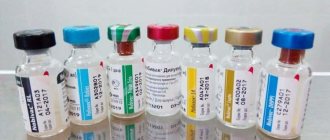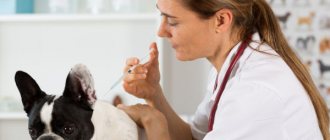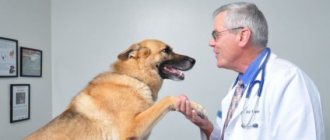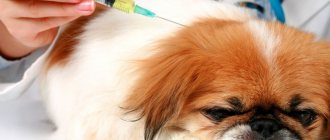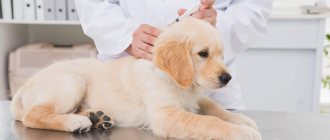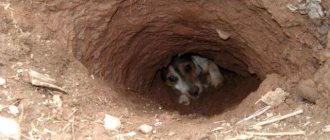Jack Russell Terrier was bred for hunting, but became popular as a toy dog. Its lifespan is 15 years. In order for a perky dog to please his owners throughout his life, it is necessary not only to love him, but also to take care of his health. One of the important points of care is vaccinations for the Jack Russell Terrier, as a prevention of dangerous diseases.
What vaccinations does a Jack Russell need?
Russells are no exception to the general rules of dog vaccination, which saves them from dangerous diseases and the consequences of illness, such as paresis, epilepsy, tics and other troubles that cause very difficult experiences for the owner and his household. Considering that out of 10 unvaccinated puppies, only 4 usually survive, then puppies must be vaccinated at an early age, according to the vaccination schedule for dogs of this breed, taking into account the recommendations of a veterinarian who shares responsibility for the health of your pet with you.
Why is vaccination necessary?
Vaccinations against infectious diseases can provide maximum protection for a dog's body against fatal diseases. If a weakened pathogen is introduced into the animal's body in small quantities, immunity is developed. Then the disease is much easier to bear, or the dog will not get sick even in the most unfavorable circumstances. It all depends on compliance with the vaccination schedule for the Jack Russell Terrier, their quality and the preparation of the dog for vaccination. Given the specific nature of dogs of this breed (high mobility and hunting instincts), their infection may occur more often than in calmer breeds.
Infectious diseases against which Jack Russells are vaccinated
The most life-threatening disease for a dog, plague, known since the time of Aristotle, is caused by a virus. Carriers of plague are rodents, birds, cats, as well as parasitic insects. The plague virus can be brought home on shoes. Outbreaks of the disease occur in the spring and fall, although the small, smooth-haired Jack Russell dog can also become ill in the winter due to hypothermia. Often there is an unfavorable outcome of the disease, or severe complications remain.
All dogs are susceptible to parvovirus enteritis, but puppies (2.5-3 months) are most susceptible to it. Diseases begin in the spring and decline by winter. The disease is difficult to treat, and delay in providing assistance can lead to death.
Infectious hepatitis resembles the plague in its symptoms and occurs with damage to the kidneys, liver, and central nervous system. Infection occurs through direct contact with sick or recovered dogs.
Leptospirosis is less common, but since rats, cats, and mice are susceptible to this disease, Jack Russell puppies must be vaccinated against this disease, especially considering the susceptibility of humans to it. Rabies always ends in death.
Vaccines and serums
Serums of the Giskon-5 type form passive immunity for 14 days, in contrast to vaccines that produce active immunity for a long time. "Giscon-5" is used for the prevention or treatment of plague, parvovirus and coronavirus enteritis, as well as adenovirosis. Sometimes, to avoid risks, the serum is administered 10 days before vaccination to the entire litter. Vaccines produce active immunity for a long time.
Two types of vaccines:
- monovalent
- polyvalent.
Animals are vaccinated against one disease with a monovalent vaccine. Veterinarians usually recommend polyvalent vaccinations with a complex of drugs against several diseases at the same time.
First vaccinations for puppies. Vaccination schedules.
Responsible owners are interested in the health of their dog, and therefore try to give their puppies all the necessary vaccinations on time.
Let's look at what vaccinations are given to puppies up to one year old, at what age what vaccinations should be done, and how to care for the puppy after vaccination.
What is a vaccination?
Recently, many different controversies have flared up around vaccinations. So what are vaccinations and why are they given to dogs?
Vaccination is the introduction into the body of so-called antigenic material (weakened or killed bacteria or viruses, as well as their proteins) to create immunity to a specific disease.
Since stray dogs and cats are still found in cities and often carry dangerous infectious diseases, vaccination of puppies is mandatory. In this way, you can protect not only your own pet from infection, but also all those animals with which it comes into contact, and in some cases, members of your family.
Dogs that have not received all necessary vaccinations in a timely manner are not allowed to participate in exhibitions.
Diseases against which puppies are vaccinated
- Rabies
is an extremely dangerous viral disease that can also infect humans. The virus is transmitted from a sick animal through the saliva of a bite. According to statistics, people most often become infected with rabies from dogs, and dogs can become infected from wild animals - foxes, wolves, hedgehogs and even crows. Cats also get rabies. For dogs and other pets, the disease is often fatal, and fatal cases are also common among humans. At the same time, vaccination against this disease is tolerated by puppies quite easily. This vaccination is given to the dog every year. - Canine distemper (canine distemper)
is another dangerous disease caused by a virus. Distemper affects dogs, as well as foxes, wolves, ferrets and other wild carnivores. People do not become infected with distemper, and cats are not susceptible to this virus. However, for dogs this disease is extremely dangerous, it affects the central nervous system and often leads to death. The virus is transmitted through the respiratory tract or through the digestive tract. Puppies tolerate distemper vaccination easily, with only occasional side effects observed. - Leptospirosis
is a widespread bacterial disease that affects almost all domestic and farm animals, many wild animals and humans. The pathogen can be transmitted through direct contact with an infected animal, as well as with food or water. Leptospirosis is accompanied by liver damage and often leads to death. - Parvovirus gastroenteritis
is a viral disease that affects the gastrointestinal tract. Young dogs are most susceptible to the disease and have the highest mortality rate. Parvovirus gastroenteritis affects all breeds of dogs, but cats and people do not get sick. It is transmitted through direct contact with infected animals and excrement.
Puppies are also vaccinated against infectious hepatitis, parainfluenza and bardetellosis.
First vaccinations for puppies
Vaccinations for puppies are carried out according to a specific vaccination schedule. Vaccinations must be carried out by a veterinarian! He will also tell you the best vaccine for your dog.
The first vaccination is given to a puppy at the age of 2 months, since by two months the puppies have already stopped suckling their mother and the effect of the antibodies in mother's milk ceases.
However, other options are also possible:
If there is an increased risk of infection, vaccinations can be done earlier - at 3-4 weeks.
If the puppy is sick, the vaccination is done later, after he has recovered.
If the puppy's ears need to be cropped, vaccination is postponed for at least 2 weeks.
The vaccination against benthism is done either before or after changing teeth.
14 days before vaccination, the puppy should be given anthelmintic drugs, either once or repeatedly (as indicated in the instructions).
During the first vaccination, vaccines against distemper, infectious hepatitis, parvovirus enteritis, parainfluenza, leptospirosis and bardetellosis are usually administered.
After vaccination, the body produces antibodies against the pathogens of these diseases. This process takes about two weeks. At this time, the puppy may have a fever, lethargy, and poor appetite. The puppy should not be taken outside, should not be washed or trained, and interaction with other dogs should be avoided.
The second vaccination is usually given three weeks after the first. At the same time, the same vaccines are administered and a rabies vaccine is added.
After the second vaccination, the puppy's general condition is usually better than after the first. However, he should also not be taken out for walks, washed, or over-exerted with activities.
Further vaccinations for the dog
The pet receives further vaccinations annually, and then annually with complex vaccines.
In these cases, it should also be taken into account that only a completely healthy dog can be vaccinated; before this, worms should be removed, and after vaccination, the dog should not be bathed or overloaded.
If you have a question about when you can go for a walk after vaccination, then keep in mind that immunity to infections develops only after two weeks. At this time, the dog is especially vulnerable, since the body is weakened by the vaccination. And if a puppy of 2-3 months can be kept in home quarantine for 14 days, then this is much more difficult to do with a one-year-old dog. In this case, take your dog out to relieve itself, but avoid long walks or contact with other dogs. Also keep in mind that at least a month must pass between vaccination and the dog’s participation in the exhibition.
Nobivak vaccination scheme
One of the most modern and most popular vaccines is Nobivac (NOBIVAC MSD Animal Health, Holland). It is very convenient and has different options. Nobivak is produced in the form of injection solutions and internal sprays.
The Nobivak vaccination scheme generally corresponds to the scheme already discussed above:
Vaccinations carried out in this way will protect your pet from dangerous infections that may await him while walking or interacting with other dogs.
Take care of your pet!
Timely prevention of infectious diseases in your dog will protect you from many possible problems, including diseases of your family members.
Remember that in addition to the diseases for which vaccinations are given, there are many others. Therefore, take care of your dog, feed it with high-quality food, avoid hypothermia and contact with sick animals, and do not let your pet pick up food on the street. By taking care of your pet in a timely manner and having all the necessary vaccinations, you will ensure your pet good health and a long, cheerful life next to you.
Recommended vaccination schedule for Jack Russell Terrier
First, serum (if the veterinarian thinks so) - after 10 days the first vaccination (enteritis, hepatitis, distemper), after two weeks - the second vaccination (re-vaccination). Then at 4 months they are vaccinated against leptospirosis, and after changing teeth - rabies.
First vaccination for Jack Russell puppies
It is recommended to place it at 6 weeks, depending on what disease is prevalent in the area at a given time. Revaccination - at 8 weeks. Active immunity develops over a year. A year later, the vaccination is repeated. Leptospirosis and rabies are vaccinated for hunting breeds annually throughout their lives.
Further age vaccinations for Jack Russell Terriers
Responsible breeders - fans of the Russell breed , especially working types - in the first and second year remind the owners of their puppies about when, with what vaccines and according to what schedule, they need to be vaccinated. If this does not happen, consultation with a veterinarian is necessary. Veterinary science does not stand still, it develops. Today, the preferred vaccination schedule for puppies of hunting breeds, such as Jackie, is the Dutch vaccine called Nobivak.
Vaccination scheme with Nobivak drugs
The first vaccination is carried out at 6 weeks of age against plague and enteritis - Puppy DP.
Revaccination is given at 8 weeks of age against distemper, hepatitis, parvovirus (DHP) plus leptospirosis and rabies (LR).
And another revaccination is carried out at 12 weeks of age against plague, hepatitis, parvovirus (DHP) and against leptospirosis and rabies (LR).
The DHP vaccine can be replaced by DHPPi (parainfluenza vaccine).
This scheme is ideal for vaccinating hunting breeds at an early age, but only if the puppy is absolutely healthy and thoroughly prepared for vaccination. The vaccination schedule must be prescribed by a veterinarian and carried out by him. All information must be displayed in the “International Veterinary Passport of the Dog:
- dates of vaccine administration,
- name of the drug,
- doctor's signature with seal.
Where and when to do it?
To begin, choose a veterinary clinic.
It would be even better if one of your dog lovers friends recommends it to you. The clinic will issue a veterinary passport for your puppy, where throughout the dog’s life they will record information about all procedures performed. In addition, it will be needed when transporting your pet across the country and abroad to exhibitions. Try to visit, if possible, one veterinary clinic . In this way, the veterinarian will know your pet better, and he will quickly get used to his new environment. Be sure to take his phone number so that you can get urgent advice if necessary.
There are situations in which vaccinations cannot be given.
- The very first vaccination is given to the dog at 2 months. Under no circumstances should puppies be vaccinated early.
- Do them before or after changing teeth. Changing teeth reduces immunity and vaccination can provoke disease, and caries can also occur.
- Your pet, no matter what breed it is, Yorkshire Terrier or Prague Rat, should be healthy on the day of vaccination. In case of any discomfort (diarrhea, vomiting) or fever, postpone the procedure until complete recovery.
- Conduct deworming two weeks before vaccination, and also treat your puppy's fur for fleas. If there were worms, then carry out repeated deworming and only after a negative result, vaccinate.
- Do not leave the clinic immediately after the injection, wait about thirty minutes. Dogs also have allergic reactions and may need professional help.
If you adopted a puppy from a kennel, then most likely the first vaccination has already been done, and the breeder will tell you about all subsequent vaccinations for dogs according to age, and the veterinary passport has most likely already been issued. At the same time, you definitely need to make sure of this. Ask him to talk in detail about how often to vaccinate your dog. As a rule, breeders are very jealous of puppies and are happy to help beginners. Sometimes certain breeds have their own disease prevention habits. Even the familiar Toy Terriers or Chihuahuas have these. Be sure to clarify such questions with the breeder.
Before vaccination
Before vaccination, do not walk with your pet in unfamiliar places. After coming from the street, immediately wash your shoes, you can bring an infection, which is called on your feet.
After the procedure, observe the dog; on the first day, malaise, lethargy, one-time diarrhea or vomiting, a short increase in temperature, and refusal to eat are possible. Don't be alarmed, this is normal.
It’s another matter if all these symptoms do not go away on the second or third day. In this case, grab the puppy and run to the veterinary clinic! Delay is fraught with bad complications or even worse, the loss of your pet.
You can walk your dog often and for a long time after the injection only a week after revaccination. There's nothing you can do, you'll have to be patient. Agree, it would be a shame to lose an expensive puppy because of your own impatience. By the way, this period is quite suitable for teaching the dog to go to one place, to the diaper, and not throughout the apartment.
Dog vaccination schedule
There is an approximate vaccination schedule for dogs that it is advisable to adhere to, especially in the first year of life.
- 8-10 weeks – first vaccination – comprehensive against parvovirus enteritis, viral hepatitis and canine distemper.
- 12-13 weeks - revaccination - comprehensive against parvovirus enteritis, viral hepatitis and canine distemper, at the same time the first rabies vaccination is given.
- 10-12 months – revaccination – against rabies.
- 1 year – revaccination – comprehensive against parvovirus enteritis, viral hepatitis and canine distemper.
Afterwards, age-related vaccinations are given comprehensively, once a year. In general, the vaccination schedule for dogs is quite approximate, but at the same time it would be correct to adhere to the indicated ranges. For your convenience, the picture shows vaccinations for dogs by age (table):
Vaccines and serums
We have discussed the vaccination of dogs (vaccination schedule). Let's now figure out what the differences between the drugs are. The vaccine has a long-term effect and forms active immunity, therefore it is used to prevent diseases. The serum has a short-term effect, forms short-term immunity and is used in the treatment of diseases.
Vaccines are divided into polyvalent - against several infections and monovalent - against one infection.
Today, both imported and domestic drugs are at the same level and it is difficult to single out something better from them. As a rule, your veterinarian will advise which drug to use. Modern vaccines have virtually no side effects, and even a three-month-old puppy should not be afraid to get vaccinated against rabies, because science does not stand still.
General rules for preparing Jack Russell puppies for vaccination
Firstly, the animal must be dewormed, or, more simply put, free of worms. The safest drug is children's pyrantel. You just need to accurately calculate the dose based on the pet’s weight.
Secondly, monitor the puppy’s stool, if there are signs of diarrhea, look for its cause, do not introduce new food into the diet, several days before the vaccination procedure and after.
It is best to accustom your puppy to balanced dry food, but not below the premium class.
Jack Russell puppies that refuse to eat, are sleepy and lethargic cannot be considered healthy.
Taking care of your health
The Jack Russell Terrier breed is characterized by good health and resistance to pathogens of many diseases. With proper organization of care and maintenance of a pet, carefully thought-out and well-established nutrition, the dog maintains strong immunity throughout its life.
Typical diseases of the Jack Russell Terrier include diseases of the ears, eyes and nervous system, as well as problems with the musculoskeletal system. The risk of developing a particular disease can be prevented by timely vaccination and annual routine examinations of the dog by a veterinarian.
The first vaccinations for Jack Russell Terrier puppies are given at the age of 1.5 months. Dogs are given a comprehensive vaccine against hepatitis, enteritis and adenovirus. The second vaccination is given 3-4 weeks later.
Before starting vaccination, it is necessary to do a test for worms and deworm your pet. Please note that only healthy dogs can be vaccinated, so it is recommended to first show the Jack Russell Terrier to a veterinarian who will assess the dog’s condition and well-being.

